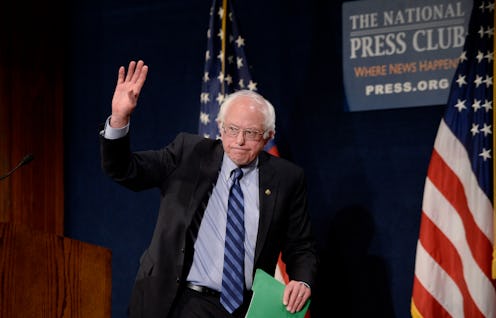News
Everyone Is Waving Bernie Goodbye
This past month has been a terrible, horrible, no good, very bad campaign stretch for Bernie Sanders. He's laid off hundreds of staffers. He lost four out of five of the Acela primaries. His funding dropped by millions of dollars. And prematurely or not, some media outlets have decided his campaign is essentially over. On Tuesday, the New York Times ran an editorial about Sanders' legacy— and you usually don't talk about someone's legacy unless they're gone. That the New York Times, an endorser of Hillary Clinton, is doing it so nicely may hint at how Democrats are trying to show Sanders to the door in the politest way possible.
The editorial says at its start, “His campaign — for the presidency, anyway — is most likely nearing its end." No mincing words here. But it goes on to craft a relatively glowing image of the Vermont senator, explaining how his campaign has made the Democratic Party better as a whole:
The Democratic Party and Mrs. Clinton are better off for Mr. Sanders’s presence in this race ... [I]t called necessary attention to unhealthy developments in the Democratic Party, including its at-times obliviousness to the lingering economic pain of the middle class and the young, and its drift toward political caution over aspiration ... Mr. Sanders has exposed a broad vein of discontent that Democrats cannot ignore.
This sounds eerily like a eulogy. The Party and Clinton aren't better off with Sanders' presence in the race— they're better off for it. The timing of such positive remarks for Sanders, when all signs point to him likely losing the race, is key, too. It's as if this is no longer the competitive part of a game, but the part in which the winner hugs the loser in a show of good sportsmanship.
It's not the only eulogy the New York Times has written, and it's not just the New York Times writing these eulogies. Last week, the newspaper ran an editorial called "Bernie Sanders' Legacy." Other major outlets like Politico and the Wall Street Journal have already penned goodbyes with the respective headlines "How Bernie Changed Hillary" and "Bernie Sanders' Legacy." And because a picture is worth a thousand eulogies, the visual absence of press at Bernie's rallies perhaps hit home the most.
Clinton is echoing the press's sentiment. Last week after her Acela primary victories, Clinton gave the speech equivalent of a winner shaking a runner-up's hand and saying, "Good game." She complimented her opponent and said, "I applaud Sen. Sanders and his millions of supporters for challenging us to get unaccountable money out of our politics and giving greater emphasis to closing the gap of inequality."
To me, Sanders' diminishing coverage is reminiscent of how Marco Rubio was slowly faded out of the race. Rubio blamed the media for the struggles in the final stretch of his run, saying that he failed to win because he had lost "the media narrative."
Sanders still insists his campaign is not over. He even said this week that "it will be a contested convention." But it's clear that some have already begun trying to put his campaign down painlessly. Sanders is now in a sort of "if a tree falls in a forest" scenario. If no one is listening, does it matter what Sanders is saying?
